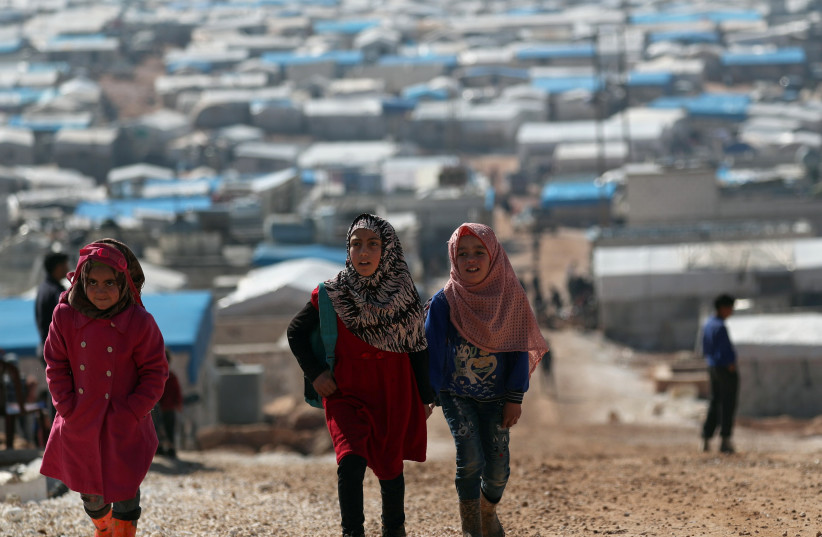Sources and reports indicate that a large number of refugees and migrants, many of them from Syria and other neighboring countries are seeking to move to Europe from Turkey.
A source that communicated with The Jerusalem Post said that many Syrian refugees in Turkey are preparing to leave the country in a “huge convoy.” Online social media accounts have called this “convoy of light” or “caravan” in an Arabic language hashtag.
Other reports indicate the number of people interested in joining the group could swell the numbers to thousands of people. Although there is an online social media campaign supporting the refugees, it is not clear how many refugees and migrants have actually gathered.
Middle East migrants seek refuge in Europe
The desire of large numbers of people to flee from Turkey or via Turkey to Europe is similar to the difficult situation that unfolded last year when large numbers of refugees and migrants were lured to Belarus with the hope they could reach western Europe. Some of these refugees are Kurdish minorities who face persecution in the region.
Turkey has hosted millions of refugees from Syria since the Syrian Civil War began in 2011. In 2015, some one million migrants and refugees left Turkey via the sea and land making their way to Greece and then onward through Serbia to Hungary and Germany.

During the 2015 crisis, The Post covered the massive number of refugees who fled from Turkey via Greece. These included Afghans, Kurds and many people from Syria and neighboring areas. Kurds from Iraq have also sought out this route to flee because of the political instability in Iraq, as well as the fact that minorities, such as Yazidis, were genocided by ISIS in 2014 and 2015.
The persecutions of ISIS and the fact that millions had to flee war in Iraq and Syria led these people to seek ways to Europe. This is because they were not hosted well in other countries. For instance, Syrians in Jordan were ostensibly welcomed but many ended up in large camps and were restricted from some occupations.
Refugees also had no prospects for success in Iran and were not welcomed in large numbers in the Gulf.
Situation of refugees in Turkey deteriorates under Erdogan
In Turkey, while they were initially welcomed and hosted, in recent years they have faced racism and also propaganda by the Turkish government aimed at either using them to cause a crisis with Greece, or using them as mercenaries. For instance, Turkey’s ruling party sought to use Syrians as mercenaries in Libya, to fight Armenia and also to fight Kurds. In essence, Turkey sought to radicalize refugees to make them fight other migrants.
In some instances, Ankara promised them they could return to Syria so long as they settled in Kurdish areas like Afrin, using Arab Syrian refugees to create demographic change. Ankara’s claims it would invest billions for the refugees in areas such as Serekaniya turned out to be smoke and mirrors.
In March 2020, Turkey, angry at European critique of its abuses in Syria, “opened” the border to Greece and tried to force migrants into Greece.
As such the refugees now find themselves stranded again. After being lured last year to Belarus so that Russia and Belarus could use them against Europe, a foreshadowing of the Russian invasion of Ukraine; they now want to try to create a convoy to Europe.
People seek media coverage of 'convoys'
The number of people seeking to join this network has increased in recent days, a source said. Media influencers, human rights abuses and other incitements have led to this gathering.
A report online says that “activists on social media called to join the convoy, which aims to leave Turkey in large numbers for Europe in the coming days…They pointed out that the number of convoy members reached 16,000 from all Turkish provinces, in light of expectations of an increase in numbers.” The activists say Syrians are suffering racism in Turkey. The activists “appealed to international organizations, human rights organizations and the media to support and assist them in facilitating the humanitarian crossing of the caravan to EU.”
One journalist wrote on Twitter, “I fear the “convoy of light”(#قافلة_النور) will turn to become a very dark chapter in humanity. Frontex won’t consider neither the deteriorating living conditions in Syria nor the increasing Turkish violent racism against Syrians or normalization with Assad more than EU’s security.”'
"I fear the convoy of light will turn to become a very dark chapter in humanity"
Journalist
People are seeking media coverage of the “convoy.” It is clear from the number of social media posts on Friday that there is an increase in desire by social media users to draw attention to the “caravan” or “convoy.”
It is not clear how many people will seek to join this group and it is not clear if the Turkish government will encourage the people to try to reach Greece. Ankara has used refugees in the past to create a crisis.
In addition, Ankara's threats to launch new offensives in Syria could drive people from Syria to become displaced. Turkey has been working closely with Russia on Syrian issues recently and Iran has been threatening US forces in Syria.
